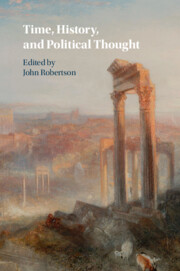Book contents
- Time, History, and Political Thought
- Time, History, and Political Thought
- Copyright page
- Contents
- Contributors
- Acknowledgements
- Note on References and the Bibliography
- Introduction: Time, History, and Political Thought
- 1 Out of Time? Eternity, Christology, and Justinianic Law
- 2 Historicity and Universality in Roman Law before 1600
- 3 ‘The Logic of Authority, and the Logic of Evidence’
- 4 Christian Time and the Commonwealth in Early Modern Political Thought
- 5 Politic History
- 6 Hobbes on the Theology and Politics of Time
- 7 The Recourse to Sacred History before the Enlightenment: Spinoza’s Theological–Political Treatise
- 8 Law, Chronology, and Scottish Conjectural History
- 9 Civilization and Perfectibility: Conflicting Views of the History of Humankind?
- 10 Kant on History, or Theodicy for Mortal Gods
- 11 Law’s Histories in Post-Napoleonic Germany
- 12 After Historicism: The Politics of Time and History in Twentieth-Century Germany
- 13 The Right to Rebel: History and Universality in the Political Thought of the Algerian Revolution
- Bibliography
- Index
3 - ‘The Logic of Authority, and the Logic of Evidence’
Published online by Cambridge University Press: 08 June 2023
- Time, History, and Political Thought
- Time, History, and Political Thought
- Copyright page
- Contents
- Contributors
- Acknowledgements
- Note on References and the Bibliography
- Introduction: Time, History, and Political Thought
- 1 Out of Time? Eternity, Christology, and Justinianic Law
- 2 Historicity and Universality in Roman Law before 1600
- 3 ‘The Logic of Authority, and the Logic of Evidence’
- 4 Christian Time and the Commonwealth in Early Modern Political Thought
- 5 Politic History
- 6 Hobbes on the Theology and Politics of Time
- 7 The Recourse to Sacred History before the Enlightenment: Spinoza’s Theological–Political Treatise
- 8 Law, Chronology, and Scottish Conjectural History
- 9 Civilization and Perfectibility: Conflicting Views of the History of Humankind?
- 10 Kant on History, or Theodicy for Mortal Gods
- 11 Law’s Histories in Post-Napoleonic Germany
- 12 After Historicism: The Politics of Time and History in Twentieth-Century Germany
- 13 The Right to Rebel: History and Universality in the Political Thought of the Algerian Revolution
- Bibliography
- Index
Summary
George Garnett explores the roles of time and history in English Common Law, and how they gave the Common Law its political salience. He begins by picking apart F.W. Maitland’s celebrated contrast between the ‘logic of evidence’, deemed to be characteristic of historical understanding, and the ‘logic of authority’, deemed to be characteristic of legal understanding. Celebrated as this statement has been, Garnett contends that the almost – but crucially not quite – antithetical relationship has never been properly understood, and that it rests in part on Maitland’s misunderstanding of how legal development and continuity worked in the period before judicial precedent became central, in the late sixteenth century. The chapter is therefore concerned both with Maitland and with the peculiar problems encountered in tracing legal development and continuity in a system which was primarily customary rather than statutory. By extension, Garnett considers the implications for explaining the use of English legal history in political thinking, particularly in the seventeenth century. Emphasis is laid on Maitland’s distaste for Sir Edward Coke, then as now, the most influential Common Law jurist.
Keywords
- Type
- Chapter
- Information
- Time, History, and Political Thought , pp. 67 - 83Publisher: Cambridge University PressPrint publication year: 2023

